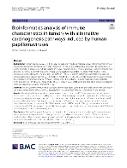Bioinformatics analysis of immune characteristics in tumors with alternative carcinogenesis pathways induced by human papillomaviruses

Publication date
2023Published in
Virology JournalVolume / Issue
20 (1)ISBN / ISSN
ISSN: 1743-422XMetadata
Show full item recordCollections
This publication has a published version with DOI 10.1186/s12985-023-02241-6
Abstract
Human papillomaviruses (HPVs) induce a subset of head and neck squamous cell carcinomas (HNSCC) and anogenital cancers, particularly cervical cancer (CC). The major viral proteins that contribute to tumorigenesis are the E6 and E7 oncoproteins, whose expression is usually enhanced after the integration of viral DNA into the host genome. Recently, an alternative tumorigenesis pathway has been suggested in approximately half of HNSCC and CC cases associated with HPV infection. This pathway is characterized by extrachromosomal HPV persistence and increased expression of the viral E2, E4, and E5 genes. The E6, E7, E5, and E2 proteins have been shown to modify the expression of numerous cellular immune-related genes. The antitumor immune response is a critical factor in the prognosis of HPV-driven cancers, and its characterization may contribute to the prediction and personalization of the increasingly used cancer immunotherapy.
Keywords
human papillomaviruses (HPVs), carcinom, cancer, immunotherapy, LILR, STING, carcinogenesis
Permanent link
https://hdl.handle.net/20.500.14178/2125License
Full text of this result is licensed under: Creative Commons Uveďte původ 4.0 International







